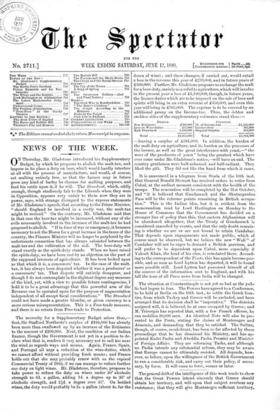The necessity for a Supplementary Budget arises thus,— first, Sir
Stafford Northcote's surplus of 2184,000 has already been more than swallowed up by an increase of the Estimates to the amount of 2200,000. Next, the condition of our Indian finance, though the Government is not yet in a position to de- clare what that is, renders it very necessary not to sail too near the wind as regards ways and means. Again, France, Spain, and Portugal all urge a reduction of the wine-duties, which we cannot afford without providing fresh means ; and France holds out that she may probably renew with us the expired Commercial Treaty of 1860, if we can manage to reduce further our duty on light wines. Mr. Orladstone, therefore, proposes to take power to reduce the duty on wines under 20° alcoholic strength to 6d. a gallon, adding id. a degree up to 35° of alcoholic strength, and 21d. a degree over V. On bottled wines, the duty would probably be 2s. a gallon (about 4s. for the
dozen of wine) ; and these changes, if carried out, would entail a loss in the revenue this year of £233,000, and in future years of 2300,000. Further, Mr. Gladstone proposes to exchange the malt for a beer-duty, mainly as a relief to agriculture, which will involve in the present year a loss of £1,100,000, though, in future years, the licence-duties which are to be imposed on the sale of beer and spirits will bring in an extra revenue of 2350,000, and even this year will bring in 2305,000. The expense is to be covered by an. additional penny on the Income-tax. Thus, the debtor and creditor sides of the supplementary estimates stand thus :— DEBTOR. CREDITOR.
New Estimates 2200,000 Id. of Income-tax 21,425,000 Loss on Wine-duties 233,000 Licence-duty 305,000 Malt Drawback 1,100,000 Original Surplus 181.000 Total 21,533,000 Total 21,914,000
—leaving a surplus of 2381,000. In addition, the burden of the malt duty on agriculture, and its burden on the processes of the brewer, as well as the great interference with yeast,—" the woes of the producers of yeast" being the greatest which have ever come under Mr. Gladstone's notice,—will have an end. The country gentlemen were half-aahamed and half-radiant. They liked the gift. They did not like the hand from which it came.


































